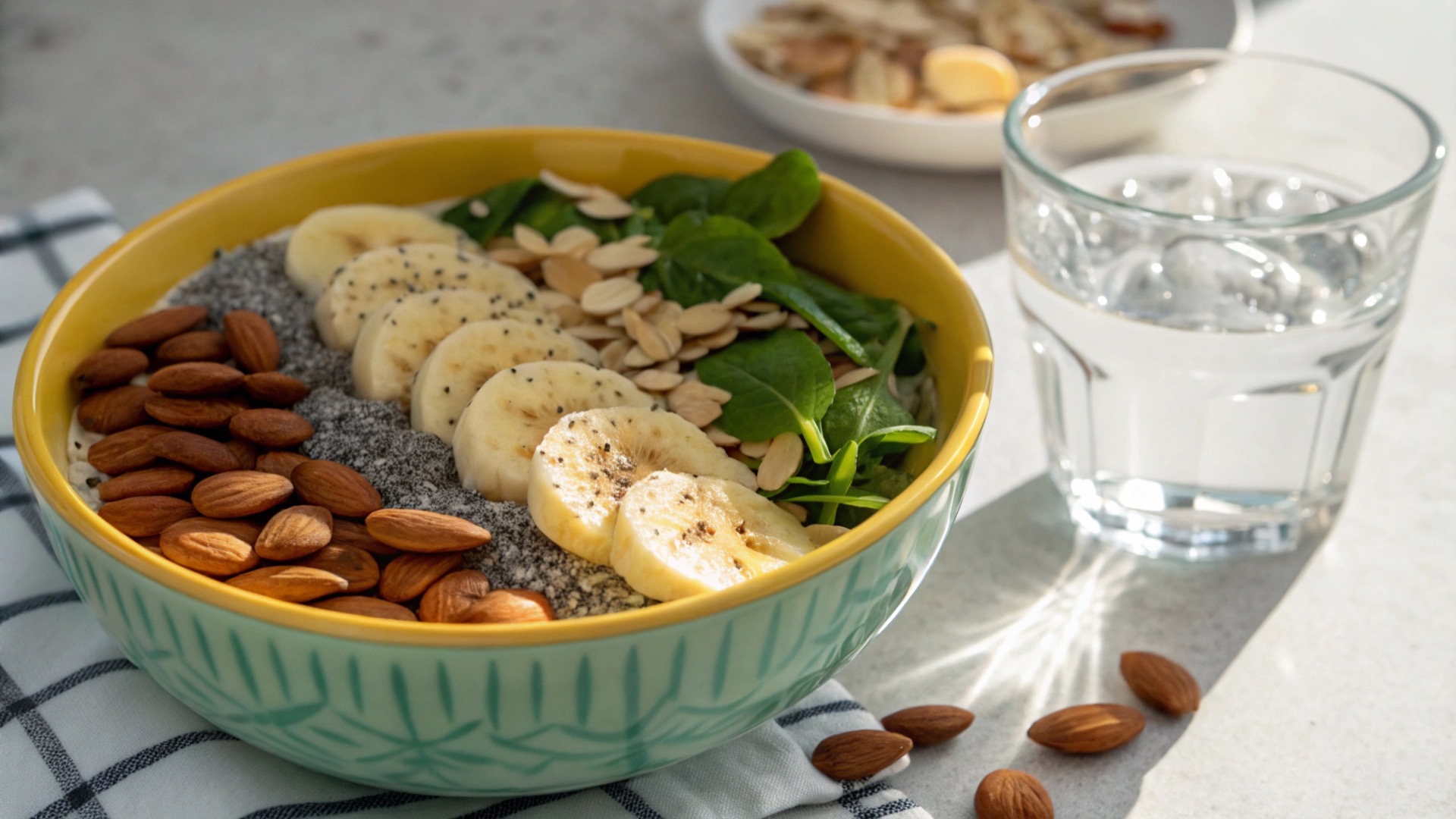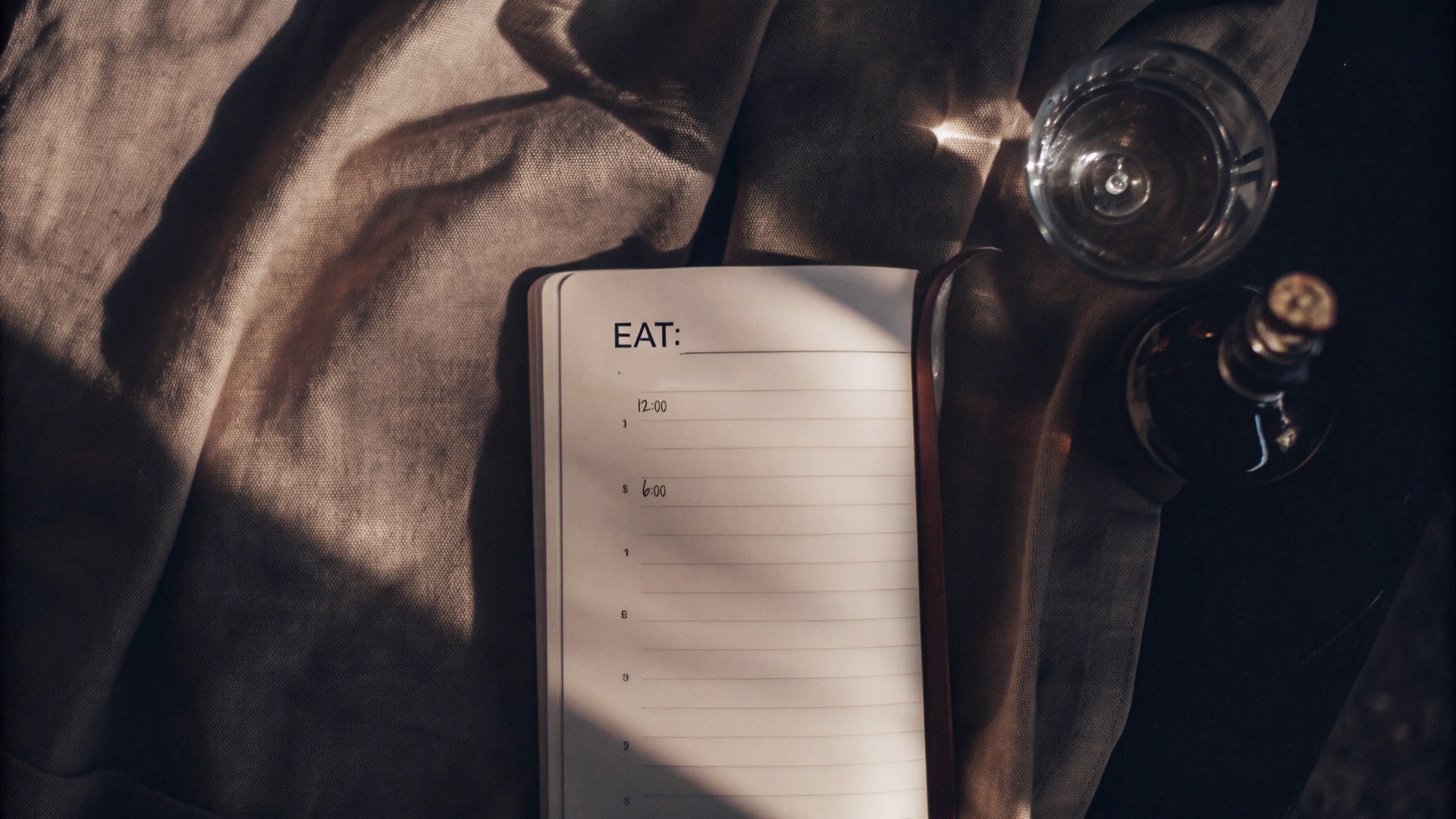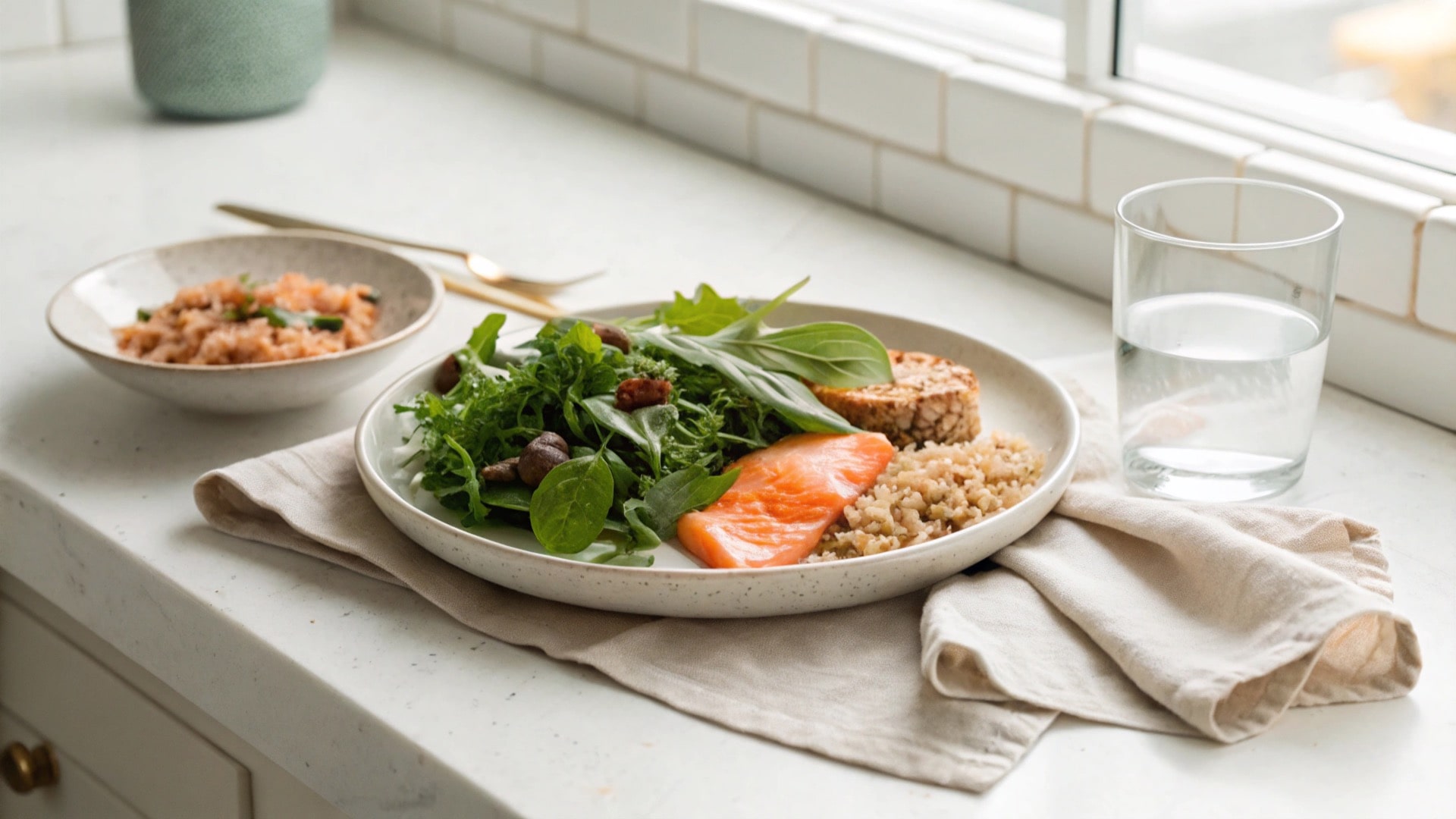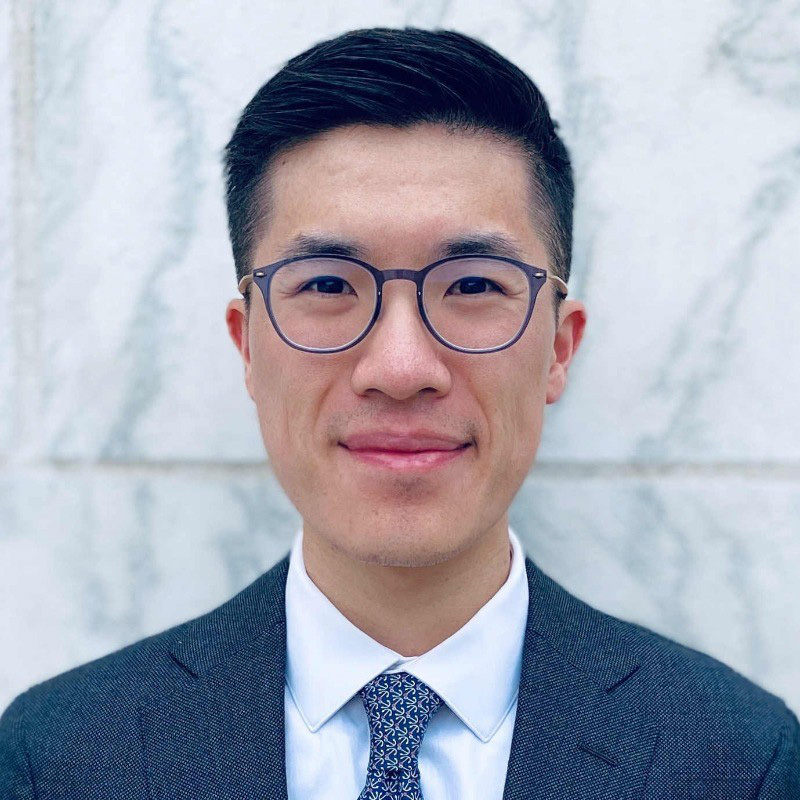Key takeaways
- Control circuits dim, cravings soar: Sleep loss cuts activity in decision-making regions and boosts the amygdala, tilting choices toward calorie-dense foods.
- High-calorie bias is measurable: After one lost night, study volunteers added about 600 “wanted” calories, with cravings rising in step with how tired they felt.
- Chronic mini-deficits matter: If a single sleepless night can flip food valuation, weeks of short sleep could quietly erode diet quality and long-term health.
Overview
Regularly skimping on sleep (<6h a night) is now tied to almost every major disease category doctors track: immune-system dysfunction, metabolic disorders, cardiovascular disease, neurodegeneration, several cancers, and autoimmune flare-ups. Short sleep also drives cognitive lapses, mood disorders, endocrine disruption, systemic inflammation, higher accident rates, and earlier all-cause mortality.
Skip a whole night’s sleep and your brain changes the way it values food. UC Berkeley scientists used functional MRI to watch this shift in real time: the regions that usually weigh long-term health went quiet, while the amygdala, your emotional “want-it-now” hub, lit up. Participants then picked far more high-calorie items, piling roughly 600 extra calories onto an imaginary plate.
Most of us don’t pull 24-hour all-nighters, but many lose an hour or two of shut-eye night after night. The study suggests even those smaller deficits can nudge the same brain circuits, quietly steering everyday choices toward donuts over salads. For busy professionals fighting jet lag, late emails, or early flights, protecting sleep or finding innovative ways to support it may be the simplest way to keep nutrition goals on track.
What is sleep deprivation?
Sleep deprivation means missing the sleep your body needs to function well. It can be a single all-nighter or losing an hour or two most nights. Over time, this shortage dulls the brain’s decision-making centers and activates its reward circuits, setting the stage for stronger cravings and increased calorie intake.
A 2013 study published in Nature Communications used 24-hour acute sleep deprivation to map brain changes. In real life, people more often suffer chronic sleep loss, and even that smaller, repeated shortfall can nudge the same decision-making circuits.
Recommended sleep varies by age. The National Sleep Foundation advises 7–9 hours for adults (18–64), 10 hours for teenagers (14–17), and 7-8 hours for older adults (65+). Falling below these ranges is linked not just to grogginess but to a host of health risks and, as the UC Berkeley study shows, to a hijacked brain that craves high-calorie foods.
What did the study say?
Twenty-three healthy college-age adults (average age=20, BMI=23) completed the experiment twice: once after a regular eight-hour sleep and once after staying awake for roughly 24 hours. During each visit, they lay in an fMRI scanner while viewing pictures of 80 foods, ranging from celery to cheesecake. After every image, they rated how much they “wanted” the item at that moment.
Here’s how the researchers kept it fair:
- Crossover design: Each participant served as their control, removing the noise of individual taste differences.
- Equal hunger: Volunteers ate identical meals before both scans; self-reported hunger scores didn’t differ between sessions.
- Energy replacement: The sleep-deprived group received ~485 extra calories overnight to offset the cost of being awake, so energy deficit alone couldn’t explain the cravings surge.
Here’s why they used an all-nighter:
Staying awake for 24 hours is more severe than most real-world scenarios, yet this severity served a purpose: it magnified the brain changes enough to see them clearly on fMRI and proved that the circuit shift is fundamental. The authors note that chronic shorter sleep, losing one or two hours a night, likely nudges the same pathways, just more subtly.
In short, even in a small, tightly controlled sample, one sleepless night rewired the brain’s food-valuation network and pushed people toward high-calorie choices.
What changed in food choices – Behavioural results
The brain shifts showed up in behaviour, too:
- High-calorie bias: After the all-nighter, volunteers chose a significantly larger share of high-calorie foods (P = 0.04), but showed no change in their selection of low-calorie options (P = 0.26).
- Bigger “imaginary plate:” their total “wanted” intake rose by ≈ 600 kcal.
- Sleepiness is associated with stronger cravings: the more exhausted a participant felt, the more high-energy foods they desired (r = 0.59, P < 0.01); this link was observed only during the sleep-deprived session.
These numbers complete the evidence chain that the study set out to test:
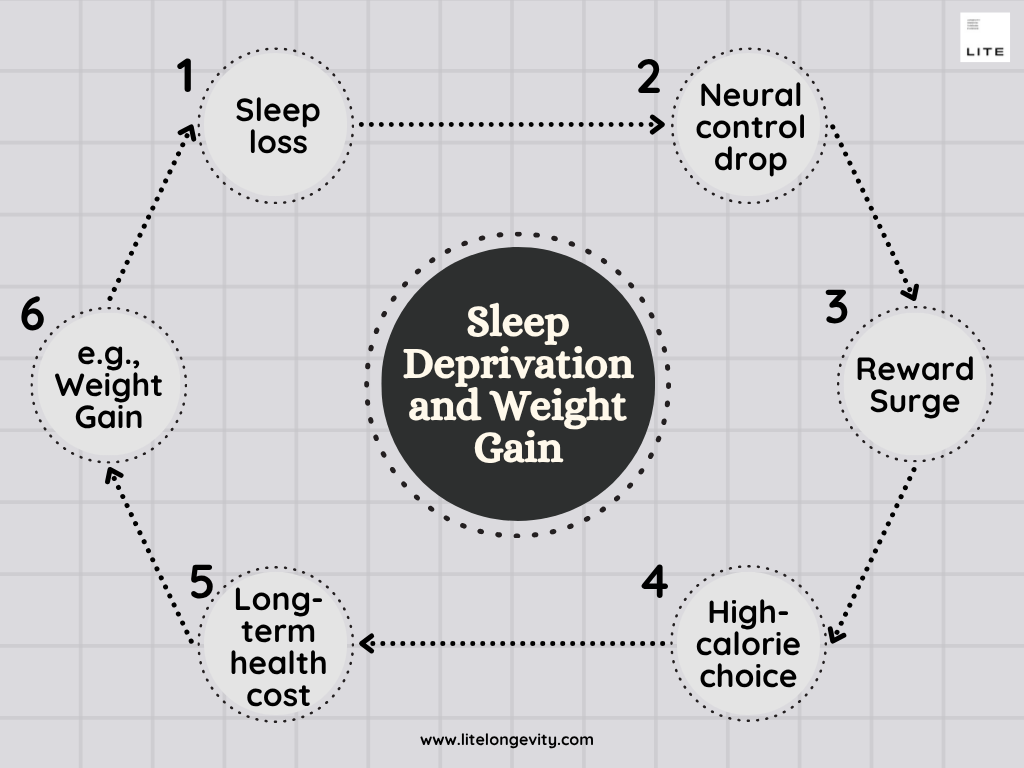
What recent studies showed?
Fresh work keeps confirming the same brain-food link:
- Scientific Reports, 2024: In a 96-person crossover trial, one night of total sleep deprivation shifted food-seeking behaviour in a Pavlovian-instrumental task: participants pressed harder for snacks when conditioned cues flashed, even after they were full, underscoring a move from goal-directed to habit-driven eating.
- Sleep, 2024: Just 90-minute bedtime cuts for two weeks raised reward-region responses to food pictures in teens, showing that mild, chronic loss, not just all-nighters, can heighten cue-driven appetites.
- Neuroscience & Biobehavioral Reviews, 2022: A meta-analysis of neuroimaging reviews pooled 25 datasets and found sleep loss routinely dials down prefrontal control hubs while ramping up reward centres when people view high-calorie foods.
Together, these recent findings echo the UC Berkeley fMRI results. Whether the deficit is acute or chronic, insufficient sleep tends to tip the neural balance toward cravings and away from restraint.
Why busy professionals should care?
Losing a whole night’s sleep is dramatic, but trimming just an hour or two from bedtime is normal these days. Neuroscience shows that even a modest deficit can press the same neural buttons. When the “brake” regions of your brain are slightly underpowered and the amygdala is a bit over-amped, calorie-dense snacks start looking like brilliant ideas.
Business travel makes those nudges stronger:
- Jet lag throws your body clock off, weakening the very regions of your brain that control impulse eating.
- Stress and late emails raise cortisol levels, which can fragment deep sleep and exacerbate cravings the next day.
- Social dinners push bedtime later, compressing the recovery window.
Over weeks, that silent drift toward calorie-dense food can add up to weight gain, sluggish afternoons, and a higher metabolic risk. This is precisely what time-pressed professionals hope to avoid.
Smart ways to limit the damage when perfect sleep isn’t possible
You can’t always control late flights, client dinners, or hotel noise. But you can buffer the brain-food fallout with evidence-based sleep supports.
| Supplement | What research shows | Typical evening dose* | Best-fit use case |
| Melatonin | Re-aligns body clock and cuts jet-lag symptoms after ≥ 5 time-zone jumps (PubMed) | 0.5–3 mg 30 min before target bedtime | Crossing multiple time zones |
| Magnesium (glycinate or L-threonate) | RCTs report better subjective sleep and daytime alertness in poor sleepers (PubMed) | 200–300 mg | Light, easily broken sleep |
| L-Theanine | 200 mg nightly lowered stress scores and improved sleep quality in adults (PubMed) | 100–200 mg | Racing mind at lights-out |
| GABA | Early studies show shorter sleep latency; combined with theanine, it may boost deep sleep (PubMed, PMC) | 100–300 mg | Trouble falling asleep |
| Ashwagandha | Standardised extract reduced cortisol and improved actigraphy-measured sleep in stressed adults (PubMed) | 300 – 500 mg | Stress-related sleep disruption |
| Tryptophan | 1g tryptophan improved sleep latency and efficiency in chronic insomnia patients (PubMed) | 500 – 1 000 mg | Difficulty initiating sleep/mood support |
*Check with your doctor, especially if you use prescription meds or have chronic conditions.
Why can a blend help?
Each ingredient works through a different pathway: circadian timing (melatonin), neural relaxation (magnesium and theanine), or GABAergic calming. A modest multi-ingredient capsule often delivers smoother, more reliable benefits than a large single-ingredient dose and is less likely to cause morning grogginess.
Quick hygiene wins still matter, and here’s why:
- Kill blue light an hour before bed; use “night mode” on devices.
- Keep the room cool (≈ 18 °C) and dark; pack a travel eye mask if needed.
- Anchor wake time, even when bedtime shifts, consistency steadies your body clock.
When you can’t carve out the perfect eight hours, these simple tweaks plus a judicious, science-backed supplement can keep your brain’s control circuits sharper, and your snack choices saner, the next day.
Limitations of the recent studies, and what researchers should test next
- Narrow age bands: One 2024 trial scanned only teenagers; another used young adults. Mid-life and older groups, the people most at risk for weight gain, remain untested.
- Lab tasks, not real eating: Participants rated food pictures or pressed levers for snacks. We still need studies that track actual cafeteria or grocery choices after short sleep.
- Short follow-ups. The longest protocol ran for two weeks of 90-minute bedtime cuts. We don’t know whether brain-craving shifts persist or adapt over the course of months of chronic sleep loss.
- Few metabolic read-outs: Most studies skipped hormones such as leptin, ghrelin, or glucose. Without them, we can’t connect brain changes to appetite-signalling chemistry.
- Limited imaging diversity. Only one recent paper paired partial sleep loss with fMRI. Replications in larger, mixed-sex cohorts are needed to confirm the neural pattern.
Next steps researchers are calling for
- Longer, everyday-life protocols: Track participants through four to eight weeks of modest sleep curtailment while monitoring real food purchases.
- Broader samples: Include women in perimenopause, high-BMI adults, and shift workers to test generalizability.
- Multi-modal measures: Combine fMRI or EEG with continuous glucose monitors and fasting hormone panels to link brain activity, hormones, and actual intake.
- Intervention trials: Test whether extending sleep or using targeted light therapy, CBT-I, or supplement stacks normalises both brain signals and food choices.
- Field-friendly imaging: Utilize portable neuroimaging tools, such as functional near-infrared spectroscopy (fNIRS), in conjunction with smartphone-based cognitive tasks, to extend research beyond the laboratory.
Bottom line
A single short night flips your brain’s food-choice switch: control centers in the frontal cortex dim, the reward-seeking amygdala brightens, and high-calorie options gain the upper hand.
Newer studies show the same pattern after milder, chronic sleep cuts and link those extra cravings to measurable weight gain in as little as five days.
Seven to nine hours of consistent, high-quality sleep remains the most effective, safest way to manage both appetite and body weight. When life won’t allow that, double down on sleep hygiene and, if needed, lean on evidence-backed aids (melatonin, magnesium, theanine) rather than sheer willpower.
Frequently asked questions (FAQs)
- Can sleep deprivation cause weight gain?
Yes, five nights of 4 hours of time-in-bed increased daily energy intake by more than 500 kcal and resulted in measurable weight gain in adults. Academic review papers now classify insufficient sleep as an independent risk factor for obesity.
- How few hours count as “sleep-deprived”?
Metabolic studies are beginning to show hormonal and craving shifts when adults drop below 6 hours of sleep or lose 1–2 hours per night for a week.
- Which brain areas change the most?
According to randomized controlled trials, fMRI studies have shown decreased activity in the anterior cingulate, lateral orbitofrontal cortex, and anterior insula, as well as heightened amygdala responses to food images after sleep loss.
- Does the type of food matter?
Cravings tend to lean toward energy-dense options, such as fried, sugary, or processed snacks, while the desire for low-calorie foods remains relatively unchanged.
- Can supplements offset insufficient sleep?
They can’t replace sleep, but low-dose melatonin (0.5–3 mg), 200–300 mg magnesium glycinate, or 100–200 mg L-theanine may improve sleep quality when schedules or travel disrupt bedtime. Always consult your doctor before taking new supplements.
References
- Greer, S., Goldstein, A. & Walker, M. The impact of sleep deprivation on food desire in the human brain. Nat Commun 4, 2259 (2013). https://doi.org/10.1038/ncomms3259
- Chaput, JP., McHill, A.W., Cox, R.C. et al. The role of insufficient sleep and circadian misalignment in obesity. Nat Rev Endocrinol 19, 82–97 (2023). https://doi.org/10.1038/s41574-022-00747-7
- R.R. Markwald,E.L. Melanson,M.R. Smith,J. Higgins,L. Perreault,R.H. Eckel, & K.P. Wright, Impact of insufficient sleep on total daily energy expenditure, food intake, and weight gain, Proc. Natl. Acad. Sci. U.S.A. 110 (14) 5695-5700, https://doi.org/10.1073/pnas. 1216951110 (2013).
- DiFrancesco, M. W., Alsameen, M., St-Onge, M. P., Duraccio, K. M., & Beebe, D. W. (2024). Altered neuronal response to visual food stimuli in adolescents undergoing chronic sleep restriction. Sleep, 47(4), zsad036. https://doi.org/10.1093/sleep/zsad036
- Tianxin Mao, Hengyi Rao, Mild sleep loss impacts food cue processing in adolescent brain, Sleep, Volume 47, Issue 4, April 2024, zsad074, https://doi.org/10.1093/sleep/zsad074



